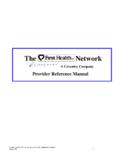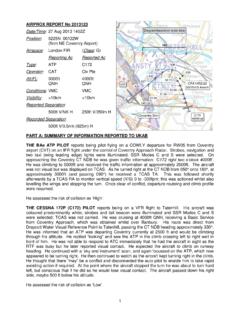Transcription of The Affordable Care Act: A Summary of Fees and …
1 The Affordable care Act: A Summary of Fees and Taxes The Affordable care Act (ACA) imposes a range of new fees and taxes on health insurance issuers ( , coventry health plans) and sponsors of group health plans ( , employers). These fees and taxes are meant to offset some of the costs incurred by the federal government. A few key points: Some of these new fees and taxes will be paid directly by health insurance issuers, while others will be paid directly by the sponsors of self-funded health plans. Some fees and taxes begin in 2013 and 2014, while others are imposed in later years.
2 Some are temporary, and others are permanent. The bottom line is that, in total, these new fees and taxes will impact premiums for all individuals covered under fully insured or self-funded plans and policies. coventry Health care is dedicated to offering our customers Affordable , quality health coverage. In keeping with this, we are implementing strategies to minimize the impact of ACA fees and taxes. This flyer gives an overview of six of the fees and taxes imposed under the ACA: Please note: This guide provides a 1. Patient-Centered Outcomes Research Institute (Comparative Effectiveness) Fee general overview of ACA fees/taxes.
3 You 2. Annual Health Insurance Industry Fee should not consider this information to be legal or compliance advice. Furthermore, 3. Transitional Reinsurance Program Assessment Fee the information contained in this document 4. Risk Adjustment Program and Fee is subject to change. Please consult legal 5. Marketplace ( , Exchange) User Fees counsel for complete information and 6. Cadillac Excise Tax (tax for high-cost plans) guidance concerning these fees/taxes. 1. Patient-Centered Outcomes Research Institute (Comparative Effectiveness) Fee What is the purpose of this fee?
4 Issuers of individual and group health insurance policies ( , coventry health plans) and health plan sponsors ( , self-funded groups) will be required to pay a new fee to help fund the Patient-Centered Outcomes Research Institute (PCORI). The PCORI was authorized by the Congress to provide evidence-based research that is intended to help people make informed health care decisions. How much will the fee cost? Policy or plan years ending Fee amount after September 30, 2012, through September 30, 2013 $1 per covered life ($ per member per month [PMPM]).
5 October 1, 2013, through September 30, 2014 $2 per covered life ($ PMPM). For each subsequent year, the fee will be equal to the sum of the fee in the prior year plus after September 30, 2014, through September 30, 2019. an adjustment by the Secretary of Treasury based on medical inflation. after September 30, 2019 $0 (Fee will be phased out.). Who is responsible for paying this fee? Fully insured plans coventry health plans pay the fee. This fee applies to both grandfathered and non-grandfathered plans. Self-funded plans The employer pays the fee.
6 It applies to both grandfathered and non-grandfathered plans. The Internal Revenue Service (IRS) does not intend to develop a process to allow third parties to file and pay this fee on behalf of self-funded employer groups. When will this fee go into effect, and when will it end? Health insurance issuers and self-funded groups must file an excise tax return form 720 by July 31 of the year after the plan/policy year ends. For example, if the last day of a plan/policy year was October 30, 2012, then form 720 must be filed by July 31, 2013.
7 The fee ends for plan/policy years beginning on or after October 1, 2019. 2. Annual Health Insurance Industry Fee What is the purpose of this fee? Health insurance issuers ( , coventry health plans) will be assessed an annual fee to fund some of the provisions of the ACA. For instance, this fee will help fund premium subsidies or cost-sharing reductions for some individuals who purchase health insurance on the exchanges. How much does this fee cost? The total amount collected from the fee will be $8 billion in 2014 and will increase to $ billion in 2018.
8 After 2018, the amount will be determined by the annual rate of premium growth. The fee will be divided proportionately between all health insurance issuers, although for-profit insurers will pay twice the amount as not-for-profit insurers. This fee is not applicable to self-funded health plans. Based on estimates from Oliver Wyman, a national consulting group, the fee could increase premiums by percent in 2014 and by 3-4 percent in later years. Who is responsible for paying this fee? Health insurance issuers will be responsible for paying this fee.
9 The fee applies to coventry health plans' fully insured, Medicare, Medicaid and dental business. It also applies to both grandfathered and non-grandfathered fully insured plans. When will this fee go into effect, and when will it end? This fee will begin to be assessed in January 2014 and is permanent. 3. Transitional Reinsurance Program Assessment Fee What is the purpose of this fee? The ACA establishes a transitional reinsurance program to help stabilize premiums for coverage in the individual market during calendar years 2014 through 2016.
10 The statute requires all health insurance issuers and third-party administrators on behalf of self- insured group health plans to pay into the program to fund payments to individual market issuers covering high-cost individuals. Each state may establish its own reinsurance program or require supplemental reinsurance contributions. If a state does not establish its own program, the Department of Health and Human Services (HHS) will operate the reinsurance program for the state. How much will this fee cost? The program will be funded over a three-year period through a transitional reinsurance assessment on health plan sponsors ($20 billion) and contributions from the Treasury ($5 billion).





